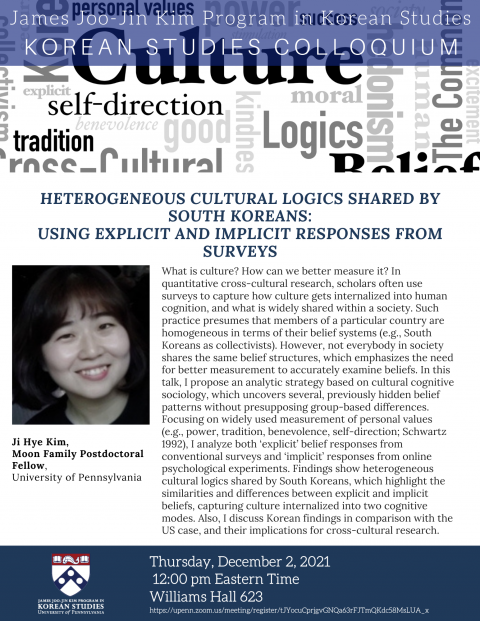
Korean Studies Colloquium
Williams Hall 623
Optional Zoom registration Here
What is culture? How can we better measure it? In quantitative cross-cultural research, scholars often use surveys to capture how culture gets internalized into human cognition, and what is widely shared within a society. Such practice presumes that members of a particular country are homogeneous in terms of their belief systems (e.g., South Koreans as collectivists). However, not everybody in society shares the same belief structures, which emphasizes the need for better measurement to accurately examine beliefs. In this talk, I propose an analytic strategy based on cultural cognitive sociology, which uncovers several, previously hidden belief patterns without presupposing group-based differences. Focusing on widely used measurement of personal values (e.g., power, tradition, benevolence, self-direction; Schwartz 1992), I analyze both ‘explicit’ belief responses from conventional surveys and ‘implicit’ responses from online psychological experiments. Findings show heterogeneous cultural logics shared by South Koreans, which highlight the similarities and differences between explicit and implicit beliefs, capturing culture internalized into two cognitive modes. Also, I discuss Korean findings in comparison with the US case, and their implications for cross-cultural research.
Ji Hye Kim is Moon Family Postdoctoral Fellow in Korean Studies at the University of Pennsylvania. She received her PhD in Sociology at the University of Iowa. Her research interests include culture and cognition, social psychology, social stratification, and cross-cultural research. Her work has appeared in journals such as Social Indicators Research, Sociology Compass, and The Asia-Pacific Education Researcher.
 James Joo-Jin Kim Center for Korean Studies
James Joo-Jin Kim Center for Korean Studies